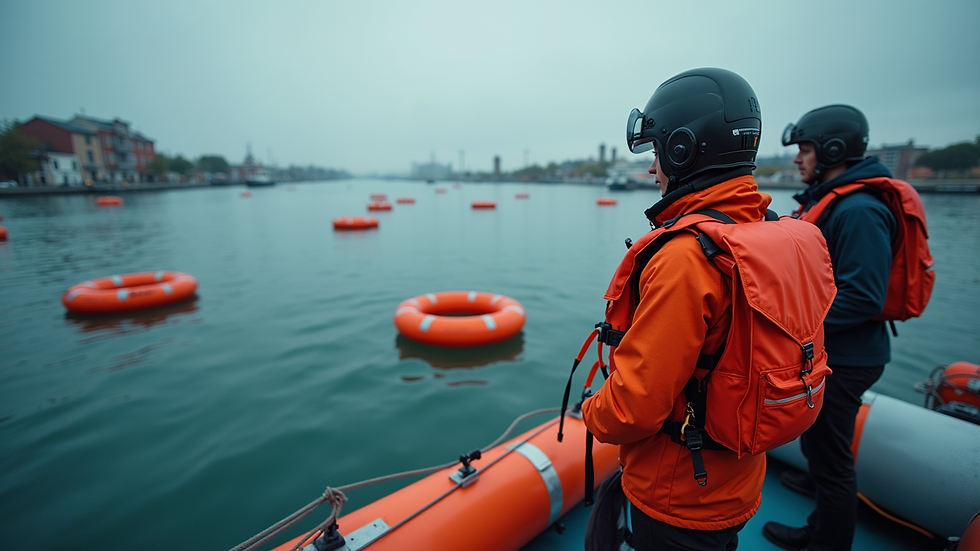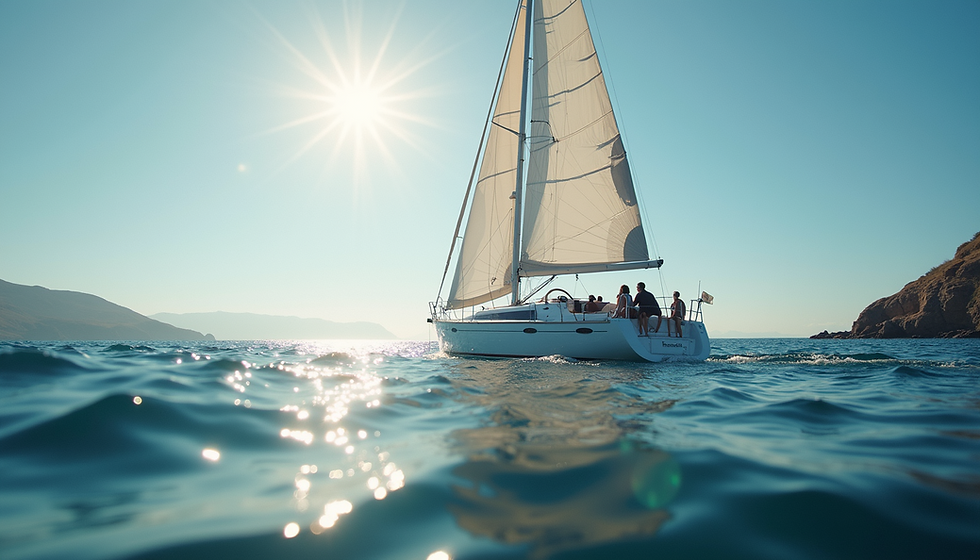Preparing for Life-Threatening Offshore Challenges
- Paul Bew City Sailing

- Aug 25
- 4 min read
Facing the unpredictable conditions of the open sea requires more than just skill and courage. It demands thorough preparation and knowledge to survive life-threatening offshore challenges. Whether you are a seasoned sailor, a commercial mariner, or an adventurer planning a long voyage, understanding the risks and how to mitigate them is crucial. This article explores essential strategies and training to help you stay safe and confident when venturing offshore.
Understanding the Importance of RYA Offshore Sea Survival Course
The ocean is a vast and often unforgiving environment. Sudden storms, equipment failure, or accidents can quickly escalate into emergencies. Offshore survival is about being ready to handle these situations effectively. It involves knowing how to use safety equipment, perform emergency procedures, and maintain calm under pressure.
Key reasons why offshore survival matters:
Unpredictable weather: Conditions can change rapidly, making navigation and safety more difficult.
Isolation: Help may be hours or days away, so self-reliance is critical.
Limited resources: Food, water, and medical supplies are finite, requiring careful management.
Physical and mental challenges: Cold water, fatigue, and stress can impair decision-making.
Preparing for these challenges means more than just having the right gear. It requires training, practice, and a clear plan for emergencies.
Essential Skills for Offshore Survival
To increase your chances of survival in offshore emergencies, focus on developing these core skills:
1. Navigation and Communication
Knowing how to navigate accurately and communicate your position is vital. Use GPS, charts, and radio equipment effectively. Practice sending distress signals and understand the protocols for emergency communication.
2. Use of Safety Equipment
Familiarise yourself with life jackets, liferafts, flares, and emergency beacons. Regularly inspect and maintain this equipment to ensure it functions correctly when needed.
3. First Aid and Medical Knowledge
Basic first aid skills can save lives. Learn how to treat hypothermia, wounds, and seasickness. Carry a well-stocked medical kit and know how to use it.
4. Survival Techniques in Water
Practice swimming in the pool and learn how to conserve energy in cold water. Understand how to board a liferaft and use survival suits.
5. Psychological Preparedness
Mental resilience is as important as physical readiness. Techniques such as controlled breathing and positive visualization can help manage panic and stress.
What is an offshore survival course?
An offshore survival course is a specialised training programme designed to equip individuals with the knowledge and skills needed to survive emergencies at sea. These courses cover a wide range of topics, including:
Emergency procedures: How to respond to fire, flooding, or abandoning ship.
Use of survival equipment: Hands-on training with liferafts, lifejackets, and signalling devices.
Survival skills: Techniques for staying afloat, managing hypothermia, and rationing supplies.
Safety regulations: Understanding maritime laws and safety standards.
We offer practical simulations, liferaft deployment, to prepare participants for real-life scenarios. Completing an RYA Sea Survival Course is a requirement for professional mariners and highly recommended for recreational sailors.

Preparing Your Vessel for Offshore Safety
Your boat or ship must be equipped and maintained to handle emergencies. Here are some practical steps to enhance offshore safety:
Regular maintenance: Check engines, fuel systems, and electrical wiring to prevent breakdowns.
Safety gear checklist: Ensure lifejackets, liferafts, fire extinguishers, and first aid kits are onboard and accessible.
Emergency plan: Develop and communicate a clear plan for all crew members, including roles and procedures.
Weather monitoring: Use reliable sources to track weather forecasts and avoid dangerous conditions.
Training drills: Conduct regular safety drills to keep everyone familiar with emergency actions.
Investing time and resources in vessel preparation can make a significant difference when facing offshore challenges.
The Role of Offshore Survival Training
One of the most effective ways to prepare for life-threatening offshore situations is through professional offshore survival training. These courses provide hands-on experience and expert guidance that cannot be gained from books or casual practice alone.
Participants learn to:
Deploy and board liferafts safely.
Use emergency signalling devices.
Manage survival situations in cold water.
Perform self-rescue and assist others.
The confidence and skills gained from such training improve decision-making and increase the likelihood of survival during emergencies.

Staying Safe Offshore: Practical Tips
To further enhance your safety offshore, consider these actionable recommendations:
Plan your route carefully: Avoid hazardous areas and have alternative plans.
Check weather conditions frequently: Be prepared to delay or change plans if necessary.
Keep communication devices charged and protected: Satellite phones and VHF radios are essential.
Wear appropriate clothing: Thermal layers and waterproof gear help prevent hypothermia.
Stay hydrated and nourished: Carry sufficient water and high-energy food.
Maintain situational awareness: Monitor your surroundings and be alert to changes.
Practice emergency drills regularly: Familiarity reduces panic and errors during real incidents.
By integrating these tips into your routine, you build a safer offshore environment for yourself and your crew.
Building Confidence for Offshore Adventures
Confidence comes from preparation and experience. The more you train and plan, the better equipped you will be to handle emergencies. Remember that offshore survival is not just about reacting to danger but anticipating and preventing it.
Join a community: Connect with other sailors and mariners to share knowledge and experiences.
Keep learning: Stay updated on new safety technologies and best practices.
Invest in quality equipment: Reliable gear can be lifesaving.
Respect the sea: Always treat offshore conditions with caution and respect.
With the right mindset and preparation, offshore challenges become manageable, and your adventures more enjoyable.
Taking the time to prepare for life-threatening offshore challenges is an investment in your safety and peace of mind. Whether through professional training, vessel readiness, or practical skills, every step you take increases your chances of survival and success at sea. Stay safe, stay prepared, and embrace the thrill of offshore exploration with confidence.




Comments